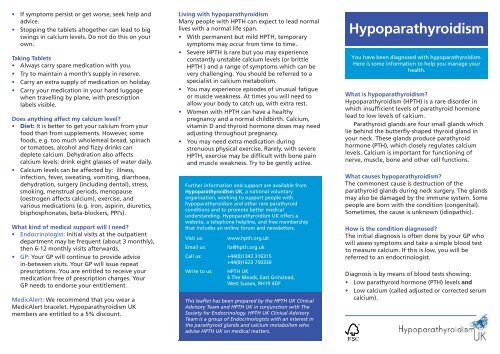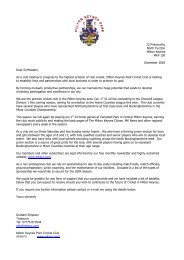Hypoparathyroidism leaflet 18_08_10 - Hypoparathyroidism UK
Hypoparathyroidism leaflet 18_08_10 - Hypoparathyroidism UK
Hypoparathyroidism leaflet 18_08_10 - Hypoparathyroidism UK
You also want an ePaper? Increase the reach of your titles
YUMPU automatically turns print PDFs into web optimized ePapers that Google loves.
• If symptoms persist or get worse, seek help andadvice.• Stopping the tablets altogether can lead to bigswings in calcium levels. Do not do this on yourown.Taking Tablets• Always carry spare medication with you.• Try to maintain a month’s supply in reserve.• Carry an extra supply of medication on holiday.• Carry your medication in your hand luggagewhen travelling by plane, with prescriptionlabels visible.Does anything affect my calcium level?• Diet: It is better to get your calcium from yourfood than from supplements. However, somefoods, e.g. too much wholemeal bread, spinachor tomatoes, alcohol and fizzy drinks candeplete calcium. Dehydration also affectscalcium levels: drink eight glasses of water daily.• Calcium levels can be affected by: illness,infection, fever, sweating, vomiting, diarrhoea,dehydration, surgery (including dental), stress,smoking, menstrual periods, menopause(oestrogen affects calcium), exercise, andvarious medications (e.g. iron, aspirin, diuretics,bisphosphonates, beta-blockers, PPI’s).What kind of medical support will I need?• Endocrinologist: Initial visits at the outpatientdepartment may be frequent (about 3 monthly),then 6-12 monthly visits afterwards.• GP: Your GP will continue to provide advicein-between visits. Your GP will issue repeatprescriptions. You are entitled to receive yourmedication free of prescription charges. YourGP needs to endorse your entitlement.MedicAlert: We recommend that you wear aMedicAlert bracelet. <strong>Hypoparathyroidism</strong> <strong>UK</strong>members are entitled to a 5% discount.Living with hypoparathyroidismMany people with HPTH can expect to lead normallives with a normal life span.• With permanent but mild HPTH, temporarysymptoms may occur from time to time.• Severe HPTH is rare but you may experienceconstantly unstable calcium levels (or brittleHPTH ) and a range of symptoms which can bevery challenging. You should be referred to aspecialist in calcium metabolism.• You may experience episodes of unusual fatigueor muscle weakness. At times you will need toallow your body to catch up, with extra rest.• Women with HPTH can have a healthypregnancy and a normal childbirth. Calcium,vitamin D and thyroid hormone doses may needadjusting throughout pregnancy.• You may need extra medication duringstrenuous physical exercise. Rarely, with severeHPTH, exercise may be difficult with bone painand muscle weakness. Try to be gently active.Further information and support are available from<strong>Hypoparathyroidism</strong> <strong>UK</strong>, a national voluntaryorganisation, working to support people withhypoparathyroidism and other rare parathyroidconditions and to promote better medicalunderstanding. <strong>Hypoparathyroidism</strong> <strong>UK</strong> offers awebsite, a telephone helpline, and free membershipthat includes an online forum and newsletters.Visit us: www.hpth.org.ukEmail us: liz@hpth.org.ukCall us: +44(0)1342 316315+44(0)1623 750330Write to us:HPTH <strong>UK</strong>6 The Meads, East Grinstead,West Sussex, RH19 4DFThis <strong>leaflet</strong> has been prepared by the HPTH <strong>UK</strong> ClinicalAdvisory Team and HPTH <strong>UK</strong> in conjunction with TheSociety for Endocrinology. HPTH <strong>UK</strong> Clinical AdvisoryTeam is a group of Endocrinologists with an interest inthe parathyroid glands and calcium metabolism whoadvise HPTH <strong>UK</strong> on medical matters.<strong>Hypoparathyroidism</strong>You have been diagnosed with hypoparathyroidism.Here is some information to help you manage yourhealth.What is hypoparathyroidism?<strong>Hypoparathyroidism</strong> (HPTH) is a rare disorder inwhich insufficient levels of parathyroid hormonelead to low levels of calcium.Parathyroid glands are four small glands whichlie behind the butterfly-shaped thyroid gland inyour neck. These glands produce parathyroidhormone (PTH), which closely regulates calciumlevels. Calcium is important for functioning ofnerve, muscle, bone and other cell functions.What causes hypoparathyroidism?The commonest cause is destruction of theparathyroid glands during neck surgery. The glandsmay also be damaged by the immune system. Somepeople are born with the condition (congenital).Sometimes, the cause is unknown (idiopathic).How is the condition diagnosed?The initial diagnosis is often done by your GP whowill assess symptoms and take a simple blood testto measure calcium. If this is low, you will bereferred to an endocrinologist.Diagnosis is by means of blood tests showing:• Low parathyroid hormone (PTH) levels and• Low calcium (called adjusted or corrected serumcalcium).
Your GP or Endocrinologist may also check:• Kidney function• Phosphate and magnesium levels• Vitamin D levelsWhen hypoparathyroidism occurs as a complicationof surgery, the symptoms may start within hours toa few days after surgery. Diagnosis of a raregenetic condition may take a little while.How is hypoparathyroidism treated?In the <strong>UK</strong>, you are likely to be prescribed:• Calcium: Mild disease can be treated withcalcium supplements alone. Each tablet ofCalcichew®, Cacit® and Calcium-500® contains500mg; Adcal® contains 600mg; Sandocal-400®and Sandocal-<strong>10</strong>00® contains 400mg and<strong>10</strong>00mg of elemental calcium respectively. Highdoses (>2000mg per day) should generally beavoided.• Vitamin D: Most patients will not achieveadequate control with calcium alone. Activeforms of vitamin D such as calcitriol oralfacalcidol are favoured over high dosecolecalciferol or ergocalciferol. They are easierto adjust in response to calcium levels.Maintenance dose of calcitriol or alfacalcidol istypically between 0.5 – 2.0 micrograms daily.Doses up to 3.0 micrograms are often required.Calcitriol (Rocaltrol®) capsules come in 0.25microgram (red/white capsules) and 0.5microgram (white capsules). Alfacalcidol(nonproprietary) capsules come in 0.25, 0.5 and1.0 microgram strengths.• Magnesium may need to be corrected inpostsurgical HPTH if levels are found to be low.• Levothyroxine (thyroid hormone replacement) isneeded if you had your thyroid gland removed.This should be taken apart from calciummedication if possible (ideally 4h, at least 2h).Usually, daily treatment is essential and lifelong.However, post-surgical HPTH may resolve. The levelof calcium in your blood will need to be checked towork out the best treatment plan.What do I need to know about my medication?• The aim of treatment is to abolish symptoms –not to restore ‘normal’ calcium levels in theblood.• In the absence of PTH, higher levels of calciumare found in the urine for a given blood calciumlevel. This can cause kidney stones or calciumdeposits in the kidneys (nephrocalcinosis), evenwhen blood calcium levels are in the ‘normal’range.• The target range is between 2.0-2.25mmol/L ofadjusted calcium levels. The target range isapproximate and depends on patient symptoms.• This is achieved with an appropriate dose ofalfacalcidol or calcitriol so that most of yourcalcium can come from your diet and you willnot need to take too many calcium supplements.The doses are typically split over the day.• Calcium should be taken at meal times.• It can take several months to get the balanceright.• Over time, your medication requirements canalso change. This is often revealed by an increaseor decrease in your calcium levels which you mayfeel as recognisable symptoms.• You and your doctor need to learn to recogniseyour particular symptoms so that yourmedication may be adjusted accordingly.• Symptoms can still be felt when the test resultsare in the normal range (2.20 – 2.60 mmol/L)which is a wide range. If your levels areunstable, keep a diary of test results, doses andsymptoms to help you recognise your symptomsand understand what is happening.What should I do in a crisis?• A ‘crisis’ can arise out of very low or very highcalcium (see below).• Seek help. You can contact your EndocrineSpecialist Nurse, Endocrinologist or your GP.• Your calcium may need to be increased or cutout for a while.• You must never adjust your alfacalcidol orcalcitriol doses on your own.Low calcium (hypocalcaemia)Early symptoms include varying degrees of ‘innershaking’, dizziness, ‘brain fog’, blurred vision,irritability, sensitivity to sounds, diarrhoea,anxiety, extreme weakness, chills, headache.‘Tetany’ is involuntary contraction of musclesand this may progress to seizures.• Symptoms can arise through, or be made worseby, anxiety and over-breathing. It is importantto remain calm.• Most mild symptoms usually pass.• If they don’t, try drinking some milk or calciumfortified orange juice or eating some food.• If after an hour symptoms still do not improve,take an extra calcium tablet. Stay calm and keepwarm. Calcium tablets take about 20 minutes towork.• Sometimes you may just need to take some ofyour day’s dose a little earlier than usualwithout actually taking more.• If this keeps happening you should get a bloodtest as it might mean your medication needsadjusting.• If you feel severely unwell or there is a suddenonset of severe symptoms, don’t wait, take extramedication and call your doctor. You need totake sufficient extra medication to prevent acrisis. An emergency injection of calcium may beneeded if your calcium levels have dropped verylow to prevent spasms developing.High calcium (hypercalcaemia)Warning signs include thirst, frequent urination,severe headache and nausea, stomach ache,depressed mood, constipation, extreme fatigue,heavy, painful limbs, confusion. None of thesymptoms are specific and may be due toconditions other than raised calcium.Mild symptoms may be averted by drinking water.










